Economics of Communism was an important economic system
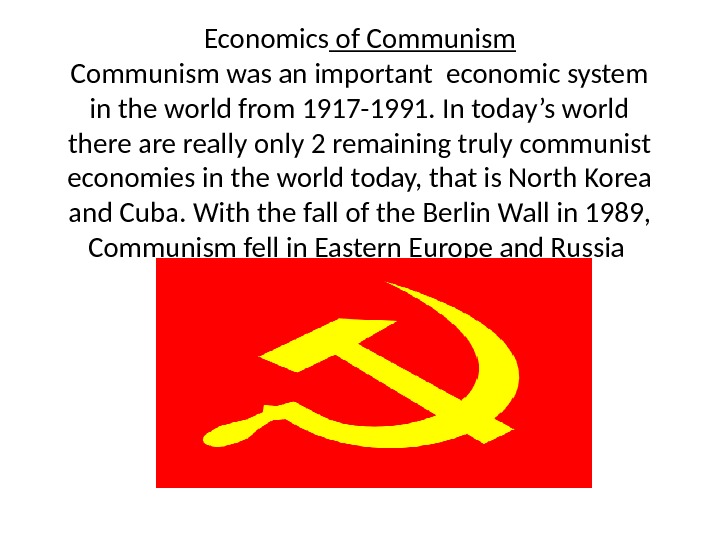
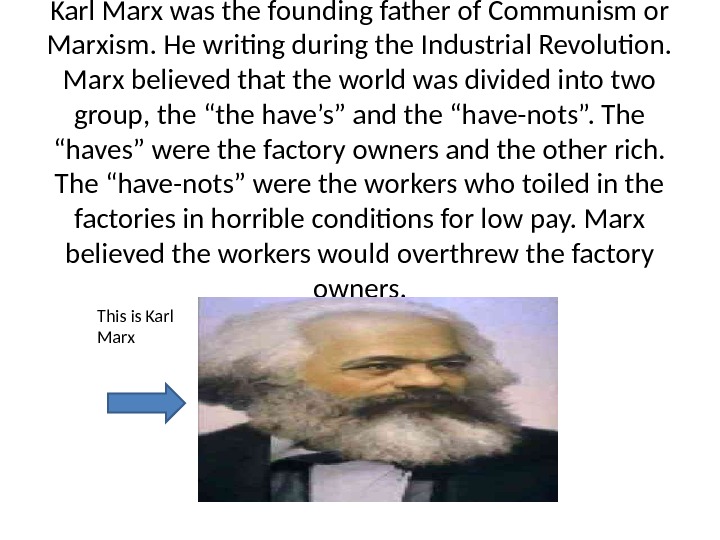
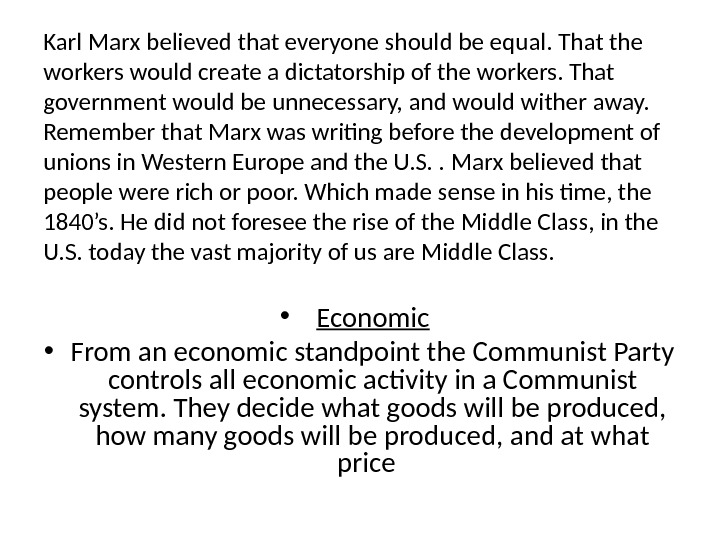
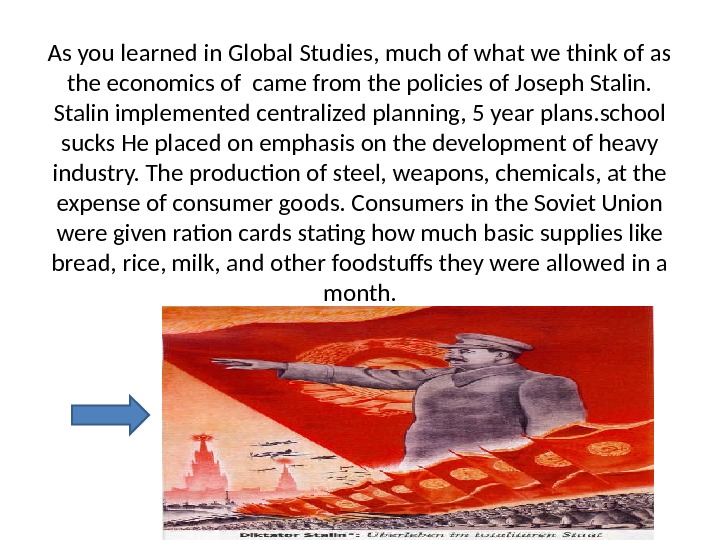
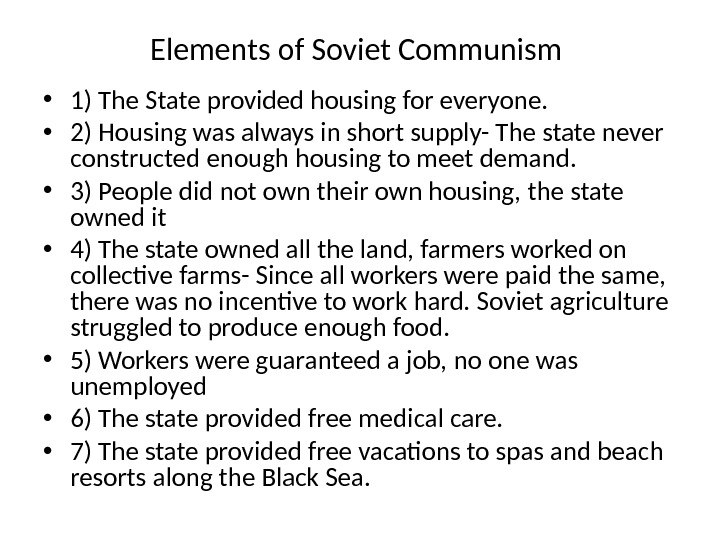
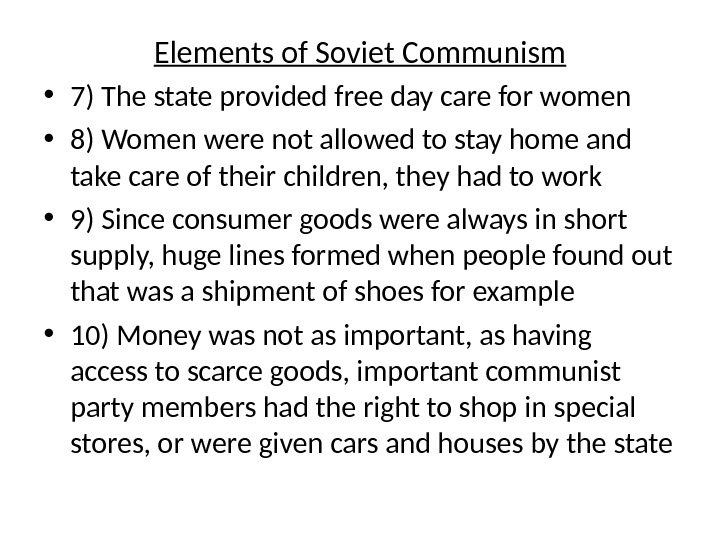
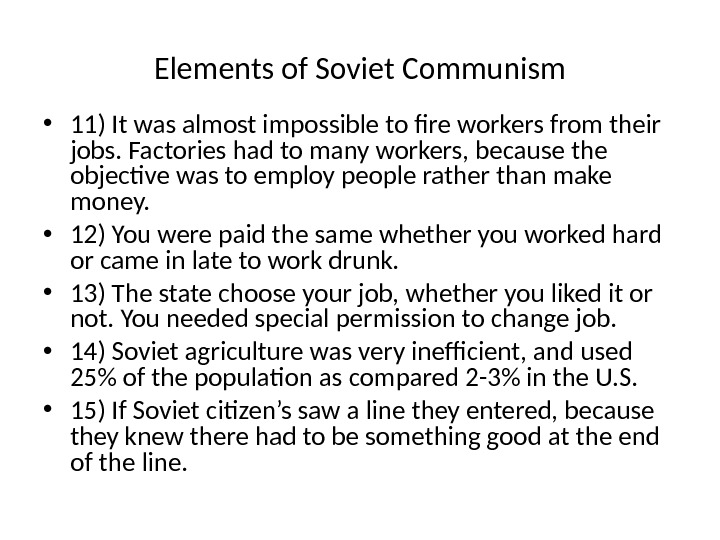
elements_of_soviet_communism.ppt
- Размер: 407 Кб
- Количество слайдов: 7
Описание презентации Economics of Communism was an important economic system по слайдам
 Economics of Communism was an important economic system in the world from 1917 -1991. In today’s world there are really only 2 remaining truly communist economies in the world today, that is North Korea and Cuba. With the fall of the Berlin Wall in 1989, Communism fell in Eastern Europe and Russia
Economics of Communism was an important economic system in the world from 1917 -1991. In today’s world there are really only 2 remaining truly communist economies in the world today, that is North Korea and Cuba. With the fall of the Berlin Wall in 1989, Communism fell in Eastern Europe and Russia
 Karl Marx was the founding father of Communism or Marxism. He writing during the Industrial Revolution. Marx believed that the world was divided into two group, the “the have’s” and the “have-nots”. The “haves” were the factory owners and the other rich. The “have-nots” were the workers who toiled in the factories in horrible conditions for low pay. Marx believed the workers would overthrew the factory owners. This is Karl Marx
Karl Marx was the founding father of Communism or Marxism. He writing during the Industrial Revolution. Marx believed that the world was divided into two group, the “the have’s” and the “have-nots”. The “haves” were the factory owners and the other rich. The “have-nots” were the workers who toiled in the factories in horrible conditions for low pay. Marx believed the workers would overthrew the factory owners. This is Karl Marx
 Karl Marx believed that everyone should be equal. That the workers would create a dictatorship of the workers. That government would be unnecessary, and would wither away. Remember that Marx was writing before the development of unions in Western Europe and the U. S. . Marx believed that people were rich or poor. Which made sense in his time, the 1840’s. He did not foresee the rise of the Middle Class, in the U. S. today the vast majority of us are Middle Class. • Economic • From an economic standpoint the Communist Party controls all economic activity in a Communist system. They decide what goods will be produced, how many goods will be produced, and at what price
Karl Marx believed that everyone should be equal. That the workers would create a dictatorship of the workers. That government would be unnecessary, and would wither away. Remember that Marx was writing before the development of unions in Western Europe and the U. S. . Marx believed that people were rich or poor. Which made sense in his time, the 1840’s. He did not foresee the rise of the Middle Class, in the U. S. today the vast majority of us are Middle Class. • Economic • From an economic standpoint the Communist Party controls all economic activity in a Communist system. They decide what goods will be produced, how many goods will be produced, and at what price
 As you learned in Global Studies, much of what we think of as the economics of came from the policies of Joseph Stalin implemented centralized planning, 5 year plans. school sucks He placed on emphasis on the development of heavy industry. The production of steel, weapons, chemicals, at the expense of consumer goods. Consumers in the Soviet Union were given ration cards stating how much basic supplies like bread, rice, milk, and other foodstuffs they were allowed in a month.
As you learned in Global Studies, much of what we think of as the economics of came from the policies of Joseph Stalin implemented centralized planning, 5 year plans. school sucks He placed on emphasis on the development of heavy industry. The production of steel, weapons, chemicals, at the expense of consumer goods. Consumers in the Soviet Union were given ration cards stating how much basic supplies like bread, rice, milk, and other foodstuffs they were allowed in a month.
 Elements of Soviet Communism • 1) The State provided housing for everyone. • 2) Housing was always in short supply- The state never constructed enough housing to meet demand. • 3) People did not own their own housing, the state owned it • 4) The state owned all the land, farmers worked on collective farms- Since all workers were paid the same, there was no incentive to work hard. Soviet agriculture struggled to produce enough food. • 5) Workers were guaranteed a job, no one was unemployed • 6) The state provided free medical care. • 7) The state provided free vacations to spas and beach resorts along the Black Sea.
Elements of Soviet Communism • 1) The State provided housing for everyone. • 2) Housing was always in short supply- The state never constructed enough housing to meet demand. • 3) People did not own their own housing, the state owned it • 4) The state owned all the land, farmers worked on collective farms- Since all workers were paid the same, there was no incentive to work hard. Soviet agriculture struggled to produce enough food. • 5) Workers were guaranteed a job, no one was unemployed • 6) The state provided free medical care. • 7) The state provided free vacations to spas and beach resorts along the Black Sea.
 Elements of Soviet Communism • 7) The state provided free day care for women • 8) Women were not allowed to stay home and take care of their children, they had to work • 9) Since consumer goods were always in short supply, huge lines formed when people found out that was a shipment of shoes for example • 10) Money was not as important, as having access to scarce goods, important communist party members had the right to shop in special stores, or were given cars and houses by the state
Elements of Soviet Communism • 7) The state provided free day care for women • 8) Women were not allowed to stay home and take care of their children, they had to work • 9) Since consumer goods were always in short supply, huge lines formed when people found out that was a shipment of shoes for example • 10) Money was not as important, as having access to scarce goods, important communist party members had the right to shop in special stores, or were given cars and houses by the state
 Elements of Soviet Communism • 11) It was almost impossible to fire workers from their jobs. Factories had to many workers, because the objective was to employ people rather than make money. • 12) You were paid the same whether you worked hard or came in late to work drunk. • 13) The state choose your job, whether you liked it or not. You needed special permission to change job. • 14) Soviet agriculture was very inefficient, and used 25% of the population as compared 2 -3% in the U. S. • 15) If Soviet citizen’s saw a line they entered, because they knew there had to be something good at the end of the line.
Elements of Soviet Communism • 11) It was almost impossible to fire workers from their jobs. Factories had to many workers, because the objective was to employ people rather than make money. • 12) You were paid the same whether you worked hard or came in late to work drunk. • 13) The state choose your job, whether you liked it or not. You needed special permission to change job. • 14) Soviet agriculture was very inefficient, and used 25% of the population as compared 2 -3% in the U. S. • 15) If Soviet citizen’s saw a line they entered, because they knew there had to be something good at the end of the line.
